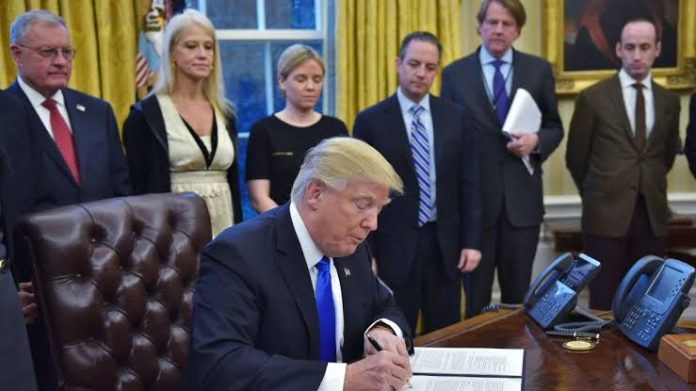Facebook Twitter (X) Instagram Somali Magazine - People's Magazine
Former President Donald Trump plans to reinstate his widely debated “travel ban” if re-elected, this time with potential expansions to include more countries. Originally implemented in 2017, the policy aimed to thoroughly scrutinise visas from nations identified as terrorism risks. Trump claims the measure was crucial for national security, though critics labeled it a discriminatory “Muslim ban.”
Revisiting the Policy’s Roots
The initial ban targeted 13 countries, including Somalia, Iran, Libya, and Syria, based on their inability to cooperate with U.S. security vetting processes. Proponents argued that the ban was a safeguard against potential terrorist threats. Trump referenced incidents like the 2016 attack at Ohio State University, where Somali-born Abdul Razak Ali Artan injured 11 people in an attack before being killed by campus police, as justification for the policy.
The policy faced significant backlash from Democratic leaders, civil rights groups, and others, leading to President Joe Biden rescinding the ban in 2021. Biden’s administration called it a discriminatory measure inconsistent with American values.
Expanded Measures in a New Era
As Trump campaigns for a potential return to the White House, he has signaled his intent to revive and broaden the policy. The former president suggests that evolving global threats require a more comprehensive approach, potentially adding nations beyond the original list to address emerging risks.
Advocates of the ban emphasize that it targeted nations that were “ungoverned” or lacked the ability to provide necessary intelligence for U.S. security checks. Critics, however, maintain that the ban disproportionately affected Muslim-majority countries, unfairly stigmatizing millions based on nationality.
Political and Public Reactions
The proposed reinstatement of the travel ban has ignited a heated political debate, underscoring a sharp divide between its proponents and critics. Supporters argue that strict immigration policies are essential for safeguarding American lives, particularly in light of past incidents tied to individuals from the targeted nations. They maintain that such measures act as a necessary national security tool, preventing potential threats from entering the United States and addressing the inability of certain countries to cooperate with U.S. intelligence processes.
Conversely, opponents see the policy as a regressive and discriminatory step that could harm America’s global reputation. They argue that the ban disproportionately affects Muslim-majority nations, stigmatizes entire populations based on nationality, and risks alienating key international allies. Critics also point to its impact on humanitarian efforts, suggesting it could prevent refugees and asylum seekers fleeing conflict from finding safety in the U.S.
As the 2024 election season heats up, the travel ban is expected to become a focal point of the national dialogue, drawing attention from both domestic and international audiences. The debate is likely to shape broader discussions about immigration reform, human rights, and counterterrorism strategies in a rapidly evolving global context.

